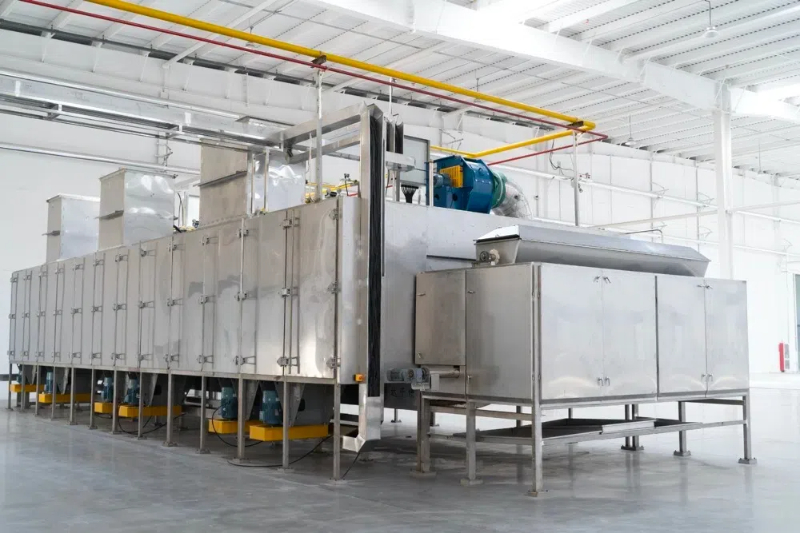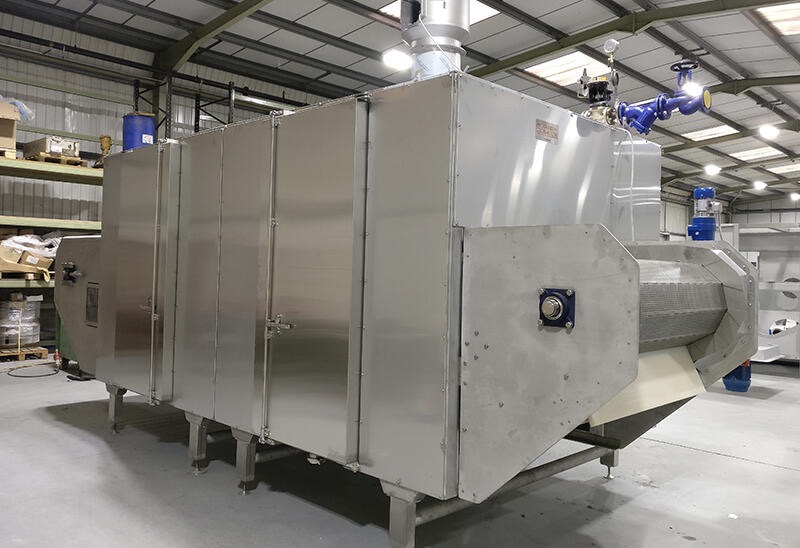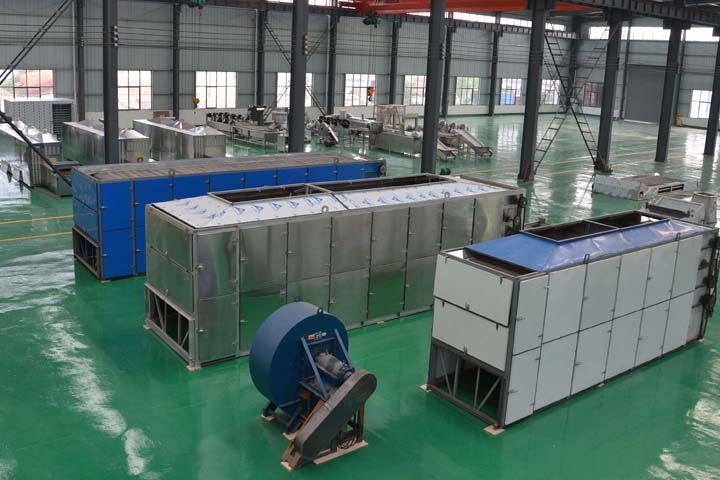
Content Menu
● Introduction to Food Drying Technology
● The Importance of Food Drying in Modern Industry
● Types of Food Drying Machines
>> Industrial Food Dehydrators
>> Commercial Fruit Dryers
>> Meat Drying Machinery
>> Vegetable Dehydration Systems
● Advancements in Food Drying Technology
>> Freeze-Drying Technology
>> High-Capacity Drying Ovens
>> Automated Food Drying Solutions
● The Role of Food Drying Machine Factories in Innovation
>> Customization and Flexibility
>> Energy Efficiency and Sustainability
● The Impact of Food Drying Machine Factories on Global Food Security
● Challenges and Future Directions
● Choosing the Right Food Drying Equipment
● Maintenance and Longevity of Food Drying Machines
● Conclusion
● Frequently Asked Questions
>> 1. What are the main advantages of using industrial food dehydrators?
>> 2. How does freeze-drying technology differ from traditional drying methods?
>> 3. What factors should be considered when choosing a commercial fruit dryer?
>> 4. How are food drying machine factories addressing environmental concerns?
>> 5. What are the latest trends in automated food drying solutions?
Introduction to Food Drying Technology
In the ever-evolving world of food processing and preservation, food drying machine factories have emerged as pivotal players in the industry. These facilities are at the forefront of developing and manufacturing cutting-edge equipment that transforms the way we preserve food on a large scale. From industrial food dehydrators to commercial fruit dryers, the range of machinery produced by these factories is as diverse as it is impressive.
The Importance of Food Drying in Modern Industry
Food drying is an ancient preservation technique that has been revolutionized by modern technology. Today, large-scale food drying equipment is essential for extending the shelf life of various food products, reducing waste, and ensuring food security across the globe. Food drying machine factories are constantly innovating to meet the growing demands of the food industry, creating more efficient and effective ways to preserve everything from fruits and vegetables to meats and herbs.
Types of Food Drying Machines
Industrial Food Dehydrators
Industrial food dehydrators are the workhorses of the food drying world. These machines are designed to remove moisture from food products efficiently and consistently. They come in various sizes and configurations to accommodate different production scales and food types. Many food drying machine factories specialize in creating customized dehydrators that cater to specific industry needs.
Commercial Fruit Dryers
The demand for dried fruits has skyrocketed in recent years, leading to the development of sophisticated commercial fruit dryers. These machines are engineered to preserve the flavor, color, and nutritional value of fruits while extending their shelf life. Food drying machine factories often incorporate advanced technologies such as infrared heating and precision humidity control in these dryers to ensure optimal results.
Meat Drying Machinery
Meat drying is a delicate process that requires specialized equipment. Meat drying machinery produced by food drying machine factories is designed to create the perfect environment for drying various types of meat products. These machines often feature precise temperature and humidity controls to prevent bacterial growth and ensure food safety.
Vegetable Dehydration Systems
Vegetable dehydration systems are crucial for preserving the abundance of seasonal produce. Food drying machine factories develop these systems to handle large volumes of vegetables, maintaining their nutritional content and flavor profile. These systems often incorporate pre-treatment processes and multi-stage drying to achieve the best results.

Advancements in Food Drying Technology
Freeze-Drying Technology
One of the most significant advancements in food preservation is freeze-drying technology. Food drying machine factories are at the forefront of developing freeze-dryers that can handle industrial-scale production. This technology allows for the preservation of food without compromising its structure or nutritional value, making it ideal for creating lightweight, long-lasting food products.
High-Capacity Drying Ovens
High-capacity drying ovens are the backbone of many food processing operations. These ovens are designed to handle large volumes of food products efficiently. Food drying machine factories continually improve these ovens, focusing on energy efficiency, uniform drying, and reduced processing times.
Automated Food Drying Solutions
Automation is transforming the food drying industry. Food drying machine factories are integrating smart technologies into their equipment, creating automated food drying solutions that require minimal human intervention. These systems can monitor and adjust drying parameters in real-time, ensuring consistent quality across batches.
The Role of Food Drying Machine Factories in Innovation
Food drying machine factories are not just manufacturing plants; they are hubs of innovation and research. These facilities often have dedicated R&D departments that work on developing new drying technologies and improving existing ones. By collaborating with food scientists and industry experts, these factories are pushing the boundaries of what's possible in food preservation.
Customization and Flexibility
One of the key strengths of food drying machine factories is their ability to customize equipment to meet specific client needs. Whether it's adapting machines for unique food products or scaling solutions for different production volumes, these factories offer the flexibility that is crucial in the diverse food industry.
Energy Efficiency and Sustainability
As the world becomes more environmentally conscious, food drying machine factories are focusing on developing energy-efficient and sustainable drying solutions. This includes incorporating renewable energy sources, improving heat recovery systems, and designing machines that minimize water usage.
The Impact of Food Drying Machine Factories on Global Food Security
The equipment produced by food drying machine factories plays a crucial role in global food security. By enabling the long-term preservation of food products, these machines help reduce food waste and ensure that nutritious food can be transported and stored for extended periods. This is particularly important in regions with limited access to fresh produce or in times of crisis.
Challenges and Future Directions
While food drying machine factories have made significant strides, they still face challenges. These include:
1. Adapting to changing food safety regulations
2. Meeting the increasing demand for organic and natural food preservation methods
3. Developing solutions for new and exotic food products
4. Balancing automation with the need for skilled operators
5. Addressing the environmental impact of large-scale food drying operations
The future of food drying machine factories lies in addressing these challenges while continuing to innovate. We can expect to see more advanced materials being used in machine construction, further integration of AI and IoT technologies, and a greater focus on modular and scalable drying solutions.

Choosing the Right Food Drying Equipment
For businesses looking to invest in food drying equipment, selecting the right machinery is crucial. Factors to consider include:
- The type and volume of food products to be dried
- Available space and energy resources
- Required level of automation
- Budget constraints
- Compliance with industry standards and regulations
Food drying machine factories often provide consultation services to help businesses make informed decisions about their equipment needs.
Maintenance and Longevity of Food Drying Machines
Proper maintenance is essential for ensuring the longevity and efficiency of food drying machines. Many food drying machine factories offer comprehensive after-sales services, including:
- Regular maintenance schedules
- Operator training programs
- Troubleshooting support
- Spare parts supply
- Machine upgrades and retrofitting
By providing these services, factories help their clients maximize the return on their investment in food drying equipment.
Conclusion
Food drying machine factories are at the heart of the food preservation industry, driving innovation and enabling the production of high-quality dried food products on an industrial scale. As we look to the future, these factories will continue to play a crucial role in addressing global food challenges, improving sustainability, and revolutionizing the way we preserve and consume food.
The advancements in food drying technology, from sophisticated freeze-drying systems to automated high-capacity drying ovens, demonstrate the industry's commitment to progress. By continuously adapting to market demands and regulatory requirements, food drying machine factories are ensuring that they remain indispensable partners in the global food supply chain.
As consumers become more conscious of food quality and sustainability, the importance of efficient and effective food drying processes will only grow. Food drying machine factories are well-positioned to meet these evolving needs, promising a future where food preservation is more efficient, sustainable, and accessible than ever before.

Frequently Asked Questions
1. What are the main advantages of using industrial food dehydrators?
Answer: Industrial food dehydrators offer several advantages, including extended shelf life of food products, preservation of nutritional value, reduction in storage space requirements, and the ability to process large volumes of food efficiently. They also help in reducing food waste and enable the creation of new product lines such as dried snacks and ingredients.
2. How does freeze-drying technology differ from traditional drying methods?
Answer: Freeze-drying, also known as lyophilization, involves freezing the food and then removing the water content through sublimation. This process preserves the food's structure, flavor, and nutritional content better than traditional drying methods. Freeze-dried foods often have a longer shelf life and retain their original shape and color more effectively than those dried through conventional heat-based methods.
3. What factors should be considered when choosing a commercial fruit dryer?
Answer: When selecting a commercial fruit dryer, consider the following factors: the types of fruits you'll be drying, your production volume, available space, energy efficiency, drying time, temperature control capabilities, ease of cleaning and maintenance, and compliance with food safety regulations. It's also important to consider the machine's ability to preserve the fruit's color, flavor, and nutritional value.
4. How are food drying machine factories addressing environmental concerns?
Answer: Food drying machine factories are addressing environmental concerns through various initiatives, including developing energy-efficient machines, incorporating renewable energy sources, improving heat recovery systems, and designing equipment that minimizes water usage. Many factories are also focusing on creating machines with longer lifespans and using more sustainable materials in their construction to reduce overall environmental impact.
5. What are the latest trends in automated food drying solutions?
Answer: The latest trends in automated food drying solutions include the integration of IoT (Internet of Things) technology for remote monitoring and control, AI-powered systems for optimizing drying parameters in real-time, advanced sensors for precise moisture and temperature control, and modular designs that allow for easy scaling and customization. There's also a growing focus on developing user-friendly interfaces and predictive maintenance capabilities to improve overall operational efficiency.












